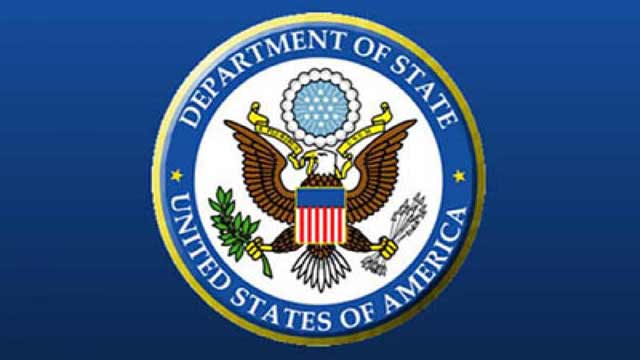State Department correspondent, Feb 27 (Just News): The US Department of State has designated ISIS-Bangladesh and to other groups as ISIS-affiliated groups.
As a result of these designations, US persons are generally prohibited from engaging in transactions with ISIS-West Africa, ISIS-Philippines, or ISIS-Bangladesh, said in a statement issued from the State Department on Tuesday. Just News BD has received a copy of the statement.
According to statement the groups’ property and interests in property subject to US jurisdiction are blocked. In addition, it is a crime to knowingly provide, or attempt or conspire to provide, material support or resources to the organizations.
In Bangladesh issue it said “In August 2014, a group of Bangladeshi nationals pledged allegiance to ISIS. The group launched its operations in September 2015 when gunmen belonging to it shot and killed an Italian aid worker in Dhaka. ISIS has since claimed numerous attacks carried out across the country. In July 2016, the group claimed responsibility for an assault on the Holey Artisan Bakery in Dhaka that killed 22 people.”
The Department has also designated four other ISIS-affiliated groups and two ISIS-affiliated leaders as Specially Designated Global Terrorists (SDGTs) under Section 1(b) of E.O. 13224. The groups are ISIS-Somalia, Jund al-Khilafah-Tunisia, ISIS-Egypt, and the Maute Group, and the individuals are Mahad Moalim and Abu Musab al-Barnawi.
E.O. 13224 imposes strict sanctions on foreign persons determined to have committed, or pose a significant risk of committing, acts of terrorism that threaten the security of U.S. nationals or the national security, foreign policy, or economy of the United States. Among other consequences, all property and interests in property of the designees are blocked, and U.S. persons are generally prohibited from engaging in any transactions with them.
In announcing these designations, Coordinator for Counterterrorism Nathan A. Sales emphasized that “these designations target key ISIS-affiliated groups and leaders outside its fallen caliphate in Iraq and Syria. Today’s actions are a critical step in degrading ISIS’s global network and denying its affiliates the resources they need to plan and carry out terrorist attacks.”
ISIS-West Africa and Abu Musab al-Barnawi
In March 2015, the leader of the FTO and SDGT group Boko Haram pledged allegiance to ISIS and changed the group’s name to ISIS-West Africa. ISIS accepted the pledge of allegiance. In August 2016, ISIS-West Africa split into two factions, due to infighting. ISIS appointed Abu Musab al-Barnawi as leader of ISIS-West Africa; the other faction, which remained loyal to longtime leader Abubakar Shekau, reverted to the previous Boko Haram name. Al-Barnawi is the son of Boko Haram founder Mohammed Yusuf. Prior to his appointment as leader of ISIS-West Africa, al-Barnawi was the spokesperson for Boko Haram. Under al-Barnawi’s leadership, ISIS-West Africa has carried out numerous attacks in Nigeria and the Lake Chad region.
ISIS-Philippines and the Maute Group
In June 2016, ISIS published a video of militants in the Philippines pledging allegiance to ISIS. In the video, militants encouraged other Muslims to join the terrorist group and support ISIS’s efforts in the region under the command of now-deceased SDGT Isnilon Hapilon – recognized by ISIS as the leader of ISIS-Philippines. The Maute Group declared its allegiance to ISIS in 2014 and is an integral part of ISIS-Philippines. The Maute Group is responsible for the siege of the City of Marawi in the Philippines, which began in May 2017; the September 2016 Davao market bombing, which killed 15 people and wounded 70 others; and the attempted bomb attack in November 2016 near the U.S. Embassy in Manila.
ISIS-Somalia and Mahad Moalim
ISIS-Somalia was formed in October 2015 after the SDGT Abdiqadr Mumin – then a senior leader of al-Shabaab – and about twenty of his followers, pledged allegiance to ISIS. The group has claimed responsibility for a May 2017 suicide bombing at a police checkpoint in Northern Somalia that left five people dead and injured 12 others and a February 2017 attack on the Village Hotel in Bosaso, Puntland, Somalia – a hotel frequented by foreigners – that killed four security guards. Mumin leads the group with Mahad Moalim acting as his deputy. Moalim is also responsible for facilitating shipments of fighters and arms from Yemen to Somalia.
Jund al-Khilafah-Tunisia
Jund al-Khilafah-Tunisia (JAK-T) emerged as a group in Tunisia in early 2014. By December 2014, JAK-T had pledged allegiance to ISIS leader Abu Bakr al-Baghdadi. The group has carried out several attacks in Tunisia, including the November 2015 beheading of a shepherd and the June 2016 land mine attack on the national army and security units. The group has also threatened attacks, such as the March 2015 YouTube audio recording that threatened attacks on senior political officials in Tunisia.
ISIS-Egypt
In May 2017, ISIS announced that ISIS-Egypt was a distinct entity from the FTO and SDGT group ISIS-Sinai Province. ISIS-Egypt has claimed responsibility for numerous attacks in Egypt; in December 2016, for example, the group bombed Cairo’s Coptic Christian cathedral, killing 28 people.
Today’s designations notify the U.S. public and the international community that these groups and individuals have committed or pose a significant risk of committing acts of terrorism. Terrorist designations expose and isolate entities and individuals, and deny them access to the U.S. financial system. Moreover, designations can assist the law enforcement activities of U.S. agencies and other governments.
These designations are part of a larger comprehensive plan to defeat ISIS that, in coordination with the Global Coalition, has made significant progress toward this goal. This whole-of-government effort is destroying ISIS in its safe havens, denying its ability to recruit foreign terrorist fighters, stifling its financial resources, countering the false propaganda it disseminates over the internet and social media, and helping to stabilize liberated areas in Iraq and Syria so the displaced can return to their homes and begin to rebuild their lives.
(Justnews/ys/0005)





